Enterprise and Entrepreneurship: My Learning Journey
VerifiedAdded on 2023/01/23
|7
|1376
|37
Report
AI Summary
This report delves into the concept of 'becoming enterprising,' exploring its meaning and impact on the author's perspective. It discusses the key learnings from the Enterprise and Entrepreneurship module, emphasizing the importance of creativity, courage, and identifying opportunities. The report highlights the significance of enterprise in job creation, the application of innovative ideas, and the acquisition of essential business skills. It covers the Start and Improve Your Business (SIYB) and Expand Your Business (EYB) programs and their contributions to economic growth. Furthermore, the report examines the entrepreneurial learning process, particularly within a social context, and defines social entrepreneurship as applying entrepreneurial skills for public benefit. The report emphasizes the roles of innovation and social change, along with the importance of research and community engagement. It also incorporates feminist perspectives to highlight the impact of gender roles on entrepreneurship, and the importance of considering alternative viewpoints to make better decisions about future actions.
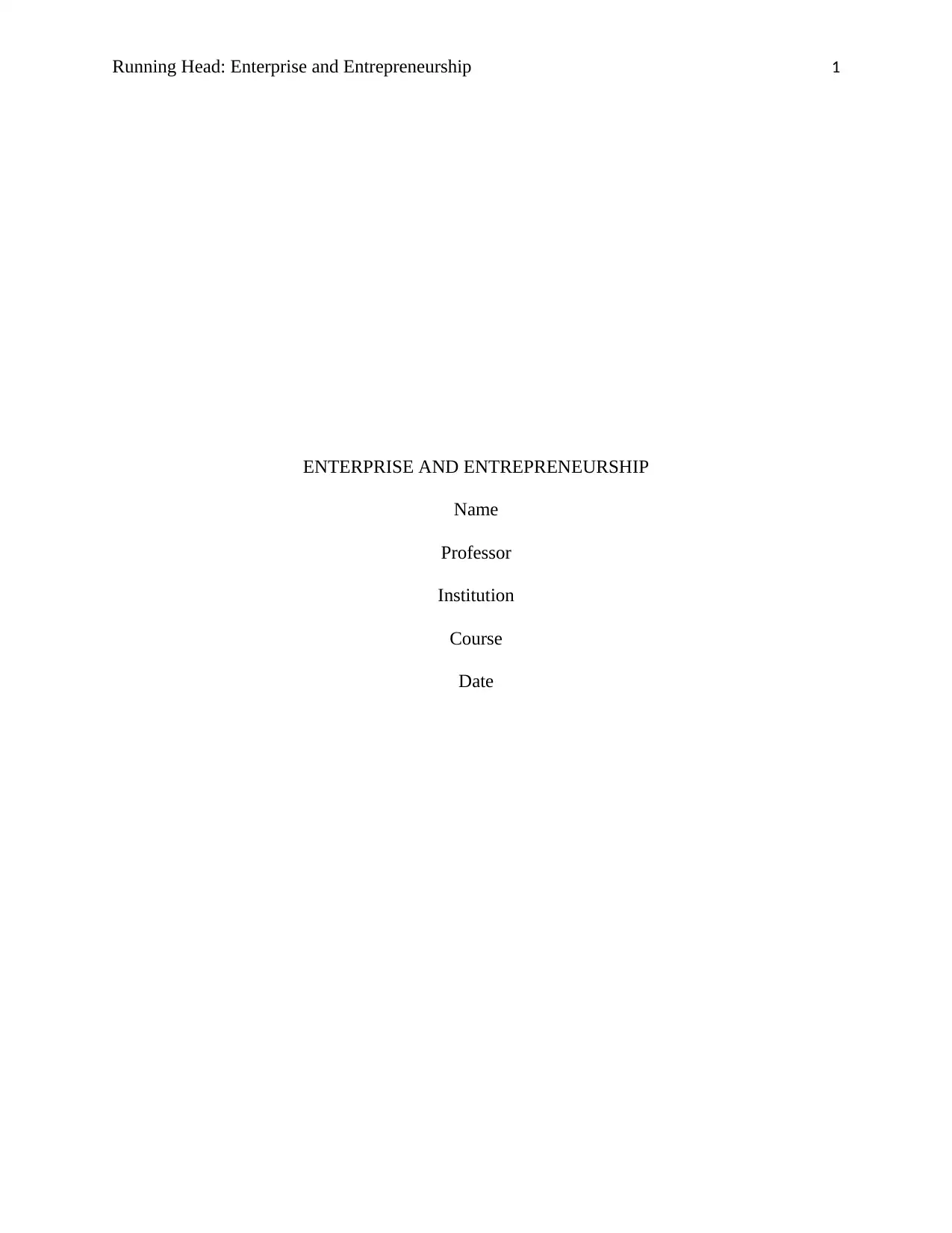
Running Head: Enterprise and Entrepreneurship 1
ENTERPRISE AND ENTREPRENEURSHIP
Name
Professor
Institution
Course
Date
ENTERPRISE AND ENTREPRENEURSHIP
Name
Professor
Institution
Course
Date
Paraphrase This Document
Need a fresh take? Get an instant paraphrase of this document with our AI Paraphraser
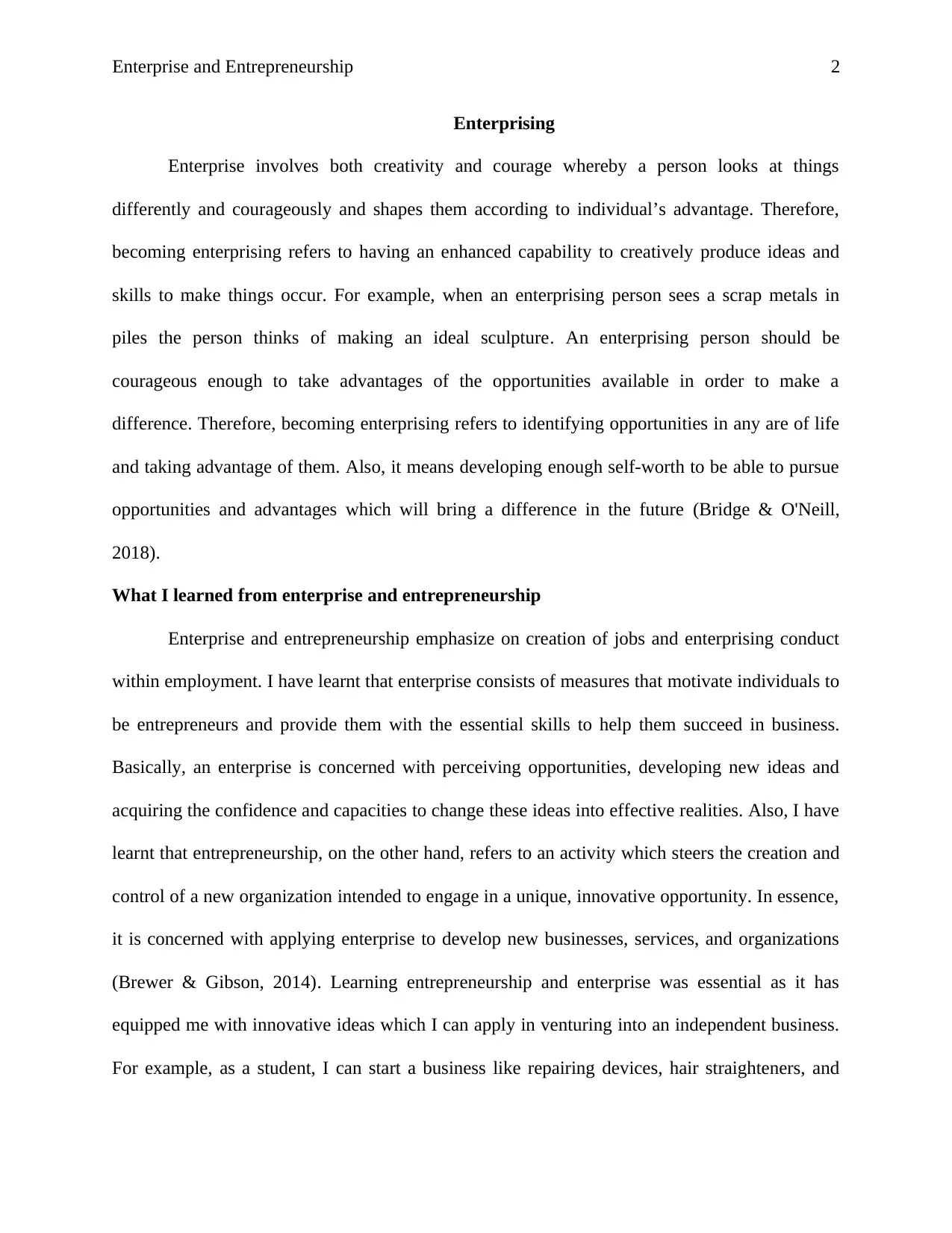
Enterprise and Entrepreneurship 2
Enterprising
Enterprise involves both creativity and courage whereby a person looks at things
differently and courageously and shapes them according to individual’s advantage. Therefore,
becoming enterprising refers to having an enhanced capability to creatively produce ideas and
skills to make things occur. For example, when an enterprising person sees a scrap metals in
piles the person thinks of making an ideal sculpture. An enterprising person should be
courageous enough to take advantages of the opportunities available in order to make a
difference. Therefore, becoming enterprising refers to identifying opportunities in any are of life
and taking advantage of them. Also, it means developing enough self-worth to be able to pursue
opportunities and advantages which will bring a difference in the future (Bridge & O'Neill,
2018).
What I learned from enterprise and entrepreneurship
Enterprise and entrepreneurship emphasize on creation of jobs and enterprising conduct
within employment. I have learnt that enterprise consists of measures that motivate individuals to
be entrepreneurs and provide them with the essential skills to help them succeed in business.
Basically, an enterprise is concerned with perceiving opportunities, developing new ideas and
acquiring the confidence and capacities to change these ideas into effective realities. Also, I have
learnt that entrepreneurship, on the other hand, refers to an activity which steers the creation and
control of a new organization intended to engage in a unique, innovative opportunity. In essence,
it is concerned with applying enterprise to develop new businesses, services, and organizations
(Brewer & Gibson, 2014). Learning entrepreneurship and enterprise was essential as it has
equipped me with innovative ideas which I can apply in venturing into an independent business.
For example, as a student, I can start a business like repairing devices, hair straighteners, and
Enterprising
Enterprise involves both creativity and courage whereby a person looks at things
differently and courageously and shapes them according to individual’s advantage. Therefore,
becoming enterprising refers to having an enhanced capability to creatively produce ideas and
skills to make things occur. For example, when an enterprising person sees a scrap metals in
piles the person thinks of making an ideal sculpture. An enterprising person should be
courageous enough to take advantages of the opportunities available in order to make a
difference. Therefore, becoming enterprising refers to identifying opportunities in any are of life
and taking advantage of them. Also, it means developing enough self-worth to be able to pursue
opportunities and advantages which will bring a difference in the future (Bridge & O'Neill,
2018).
What I learned from enterprise and entrepreneurship
Enterprise and entrepreneurship emphasize on creation of jobs and enterprising conduct
within employment. I have learnt that enterprise consists of measures that motivate individuals to
be entrepreneurs and provide them with the essential skills to help them succeed in business.
Basically, an enterprise is concerned with perceiving opportunities, developing new ideas and
acquiring the confidence and capacities to change these ideas into effective realities. Also, I have
learnt that entrepreneurship, on the other hand, refers to an activity which steers the creation and
control of a new organization intended to engage in a unique, innovative opportunity. In essence,
it is concerned with applying enterprise to develop new businesses, services, and organizations
(Brewer & Gibson, 2014). Learning entrepreneurship and enterprise was essential as it has
equipped me with innovative ideas which I can apply in venturing into an independent business.
For example, as a student, I can start a business like repairing devices, hair straighteners, and
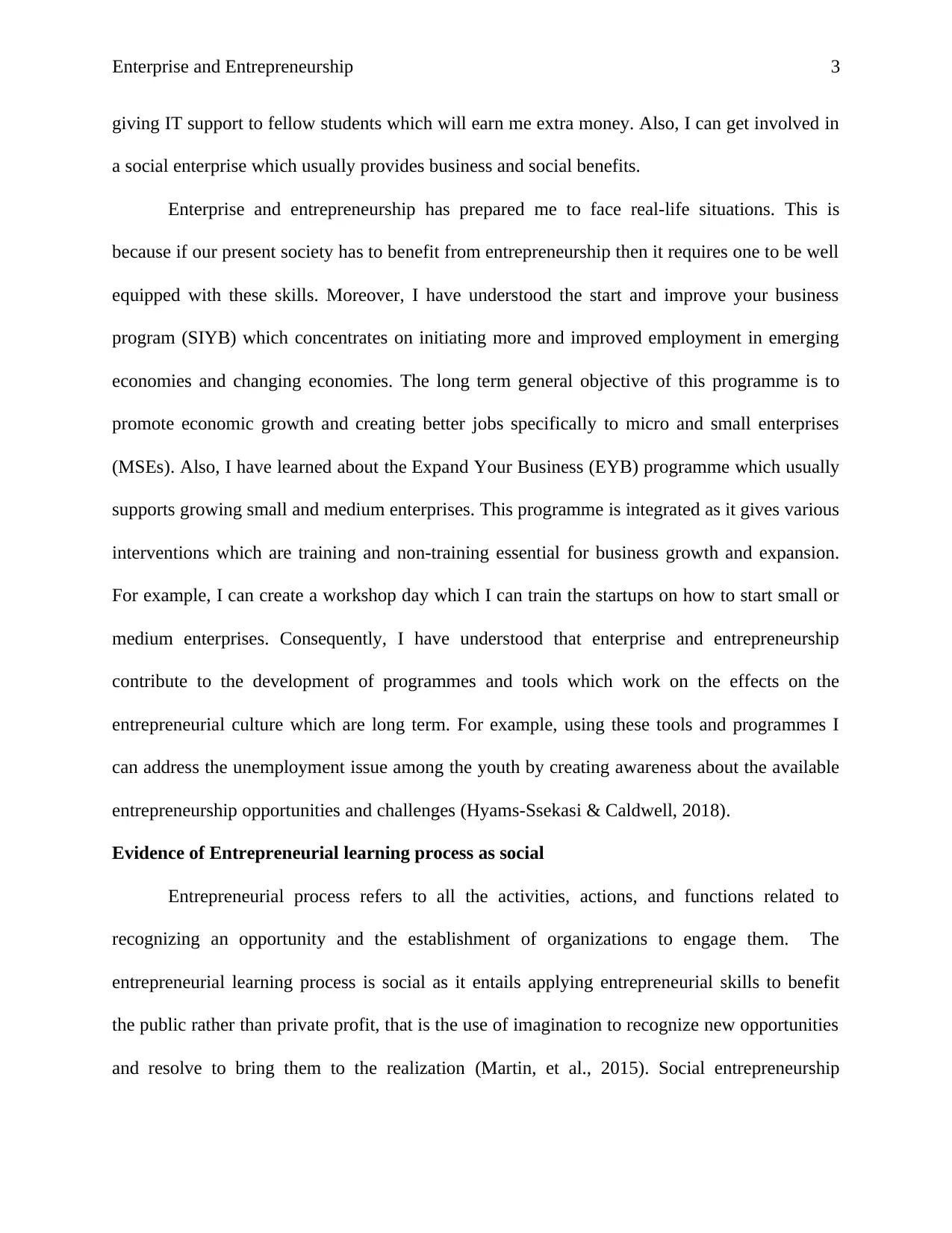
Enterprise and Entrepreneurship 3
giving IT support to fellow students which will earn me extra money. Also, I can get involved in
a social enterprise which usually provides business and social benefits.
Enterprise and entrepreneurship has prepared me to face real-life situations. This is
because if our present society has to benefit from entrepreneurship then it requires one to be well
equipped with these skills. Moreover, I have understood the start and improve your business
program (SIYB) which concentrates on initiating more and improved employment in emerging
economies and changing economies. The long term general objective of this programme is to
promote economic growth and creating better jobs specifically to micro and small enterprises
(MSEs). Also, I have learned about the Expand Your Business (EYB) programme which usually
supports growing small and medium enterprises. This programme is integrated as it gives various
interventions which are training and non-training essential for business growth and expansion.
For example, I can create a workshop day which I can train the startups on how to start small or
medium enterprises. Consequently, I have understood that enterprise and entrepreneurship
contribute to the development of programmes and tools which work on the effects on the
entrepreneurial culture which are long term. For example, using these tools and programmes I
can address the unemployment issue among the youth by creating awareness about the available
entrepreneurship opportunities and challenges (Hyams-Ssekasi & Caldwell, 2018).
Evidence of Entrepreneurial learning process as social
Entrepreneurial process refers to all the activities, actions, and functions related to
recognizing an opportunity and the establishment of organizations to engage them. The
entrepreneurial learning process is social as it entails applying entrepreneurial skills to benefit
the public rather than private profit, that is the use of imagination to recognize new opportunities
and resolve to bring them to the realization (Martin, et al., 2015). Social entrepreneurship
giving IT support to fellow students which will earn me extra money. Also, I can get involved in
a social enterprise which usually provides business and social benefits.
Enterprise and entrepreneurship has prepared me to face real-life situations. This is
because if our present society has to benefit from entrepreneurship then it requires one to be well
equipped with these skills. Moreover, I have understood the start and improve your business
program (SIYB) which concentrates on initiating more and improved employment in emerging
economies and changing economies. The long term general objective of this programme is to
promote economic growth and creating better jobs specifically to micro and small enterprises
(MSEs). Also, I have learned about the Expand Your Business (EYB) programme which usually
supports growing small and medium enterprises. This programme is integrated as it gives various
interventions which are training and non-training essential for business growth and expansion.
For example, I can create a workshop day which I can train the startups on how to start small or
medium enterprises. Consequently, I have understood that enterprise and entrepreneurship
contribute to the development of programmes and tools which work on the effects on the
entrepreneurial culture which are long term. For example, using these tools and programmes I
can address the unemployment issue among the youth by creating awareness about the available
entrepreneurship opportunities and challenges (Hyams-Ssekasi & Caldwell, 2018).
Evidence of Entrepreneurial learning process as social
Entrepreneurial process refers to all the activities, actions, and functions related to
recognizing an opportunity and the establishment of organizations to engage them. The
entrepreneurial learning process is social as it entails applying entrepreneurial skills to benefit
the public rather than private profit, that is the use of imagination to recognize new opportunities
and resolve to bring them to the realization (Martin, et al., 2015). Social entrepreneurship
⊘ This is a preview!⊘
Do you want full access?
Subscribe today to unlock all pages.

Trusted by 1+ million students worldwide
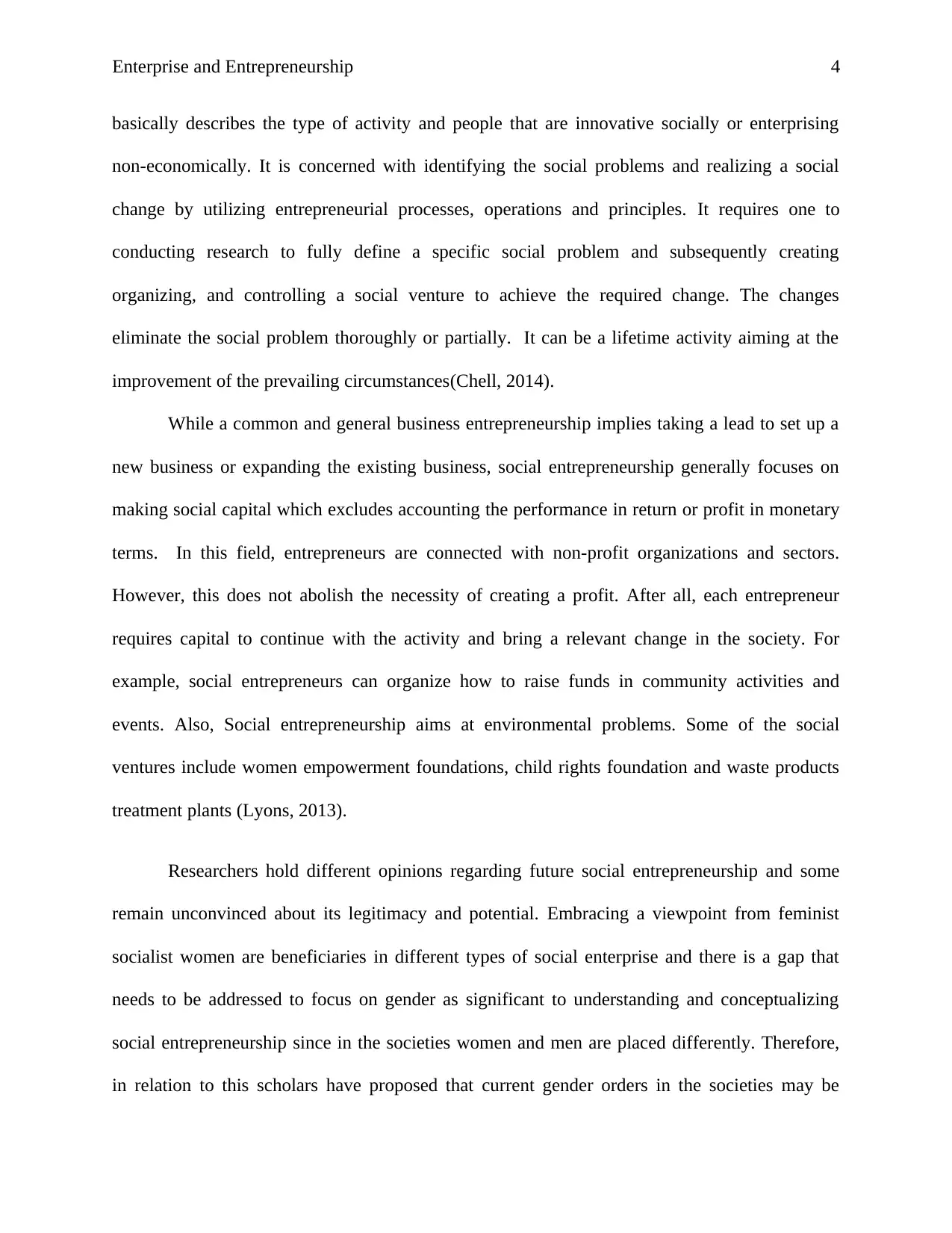
Enterprise and Entrepreneurship 4
basically describes the type of activity and people that are innovative socially or enterprising
non-economically. It is concerned with identifying the social problems and realizing a social
change by utilizing entrepreneurial processes, operations and principles. It requires one to
conducting research to fully define a specific social problem and subsequently creating
organizing, and controlling a social venture to achieve the required change. The changes
eliminate the social problem thoroughly or partially. It can be a lifetime activity aiming at the
improvement of the prevailing circumstances(Chell, 2014).
While a common and general business entrepreneurship implies taking a lead to set up a
new business or expanding the existing business, social entrepreneurship generally focuses on
making social capital which excludes accounting the performance in return or profit in monetary
terms. In this field, entrepreneurs are connected with non-profit organizations and sectors.
However, this does not abolish the necessity of creating a profit. After all, each entrepreneur
requires capital to continue with the activity and bring a relevant change in the society. For
example, social entrepreneurs can organize how to raise funds in community activities and
events. Also, Social entrepreneurship aims at environmental problems. Some of the social
ventures include women empowerment foundations, child rights foundation and waste products
treatment plants (Lyons, 2013).
Researchers hold different opinions regarding future social entrepreneurship and some
remain unconvinced about its legitimacy and potential. Embracing a viewpoint from feminist
socialist women are beneficiaries in different types of social enterprise and there is a gap that
needs to be addressed to focus on gender as significant to understanding and conceptualizing
social entrepreneurship since in the societies women and men are placed differently. Therefore,
in relation to this scholars have proposed that current gender orders in the societies may be
basically describes the type of activity and people that are innovative socially or enterprising
non-economically. It is concerned with identifying the social problems and realizing a social
change by utilizing entrepreneurial processes, operations and principles. It requires one to
conducting research to fully define a specific social problem and subsequently creating
organizing, and controlling a social venture to achieve the required change. The changes
eliminate the social problem thoroughly or partially. It can be a lifetime activity aiming at the
improvement of the prevailing circumstances(Chell, 2014).
While a common and general business entrepreneurship implies taking a lead to set up a
new business or expanding the existing business, social entrepreneurship generally focuses on
making social capital which excludes accounting the performance in return or profit in monetary
terms. In this field, entrepreneurs are connected with non-profit organizations and sectors.
However, this does not abolish the necessity of creating a profit. After all, each entrepreneur
requires capital to continue with the activity and bring a relevant change in the society. For
example, social entrepreneurs can organize how to raise funds in community activities and
events. Also, Social entrepreneurship aims at environmental problems. Some of the social
ventures include women empowerment foundations, child rights foundation and waste products
treatment plants (Lyons, 2013).
Researchers hold different opinions regarding future social entrepreneurship and some
remain unconvinced about its legitimacy and potential. Embracing a viewpoint from feminist
socialist women are beneficiaries in different types of social enterprise and there is a gap that
needs to be addressed to focus on gender as significant to understanding and conceptualizing
social entrepreneurship since in the societies women and men are placed differently. Therefore,
in relation to this scholars have proposed that current gender orders in the societies may be
Paraphrase This Document
Need a fresh take? Get an instant paraphrase of this document with our AI Paraphraser
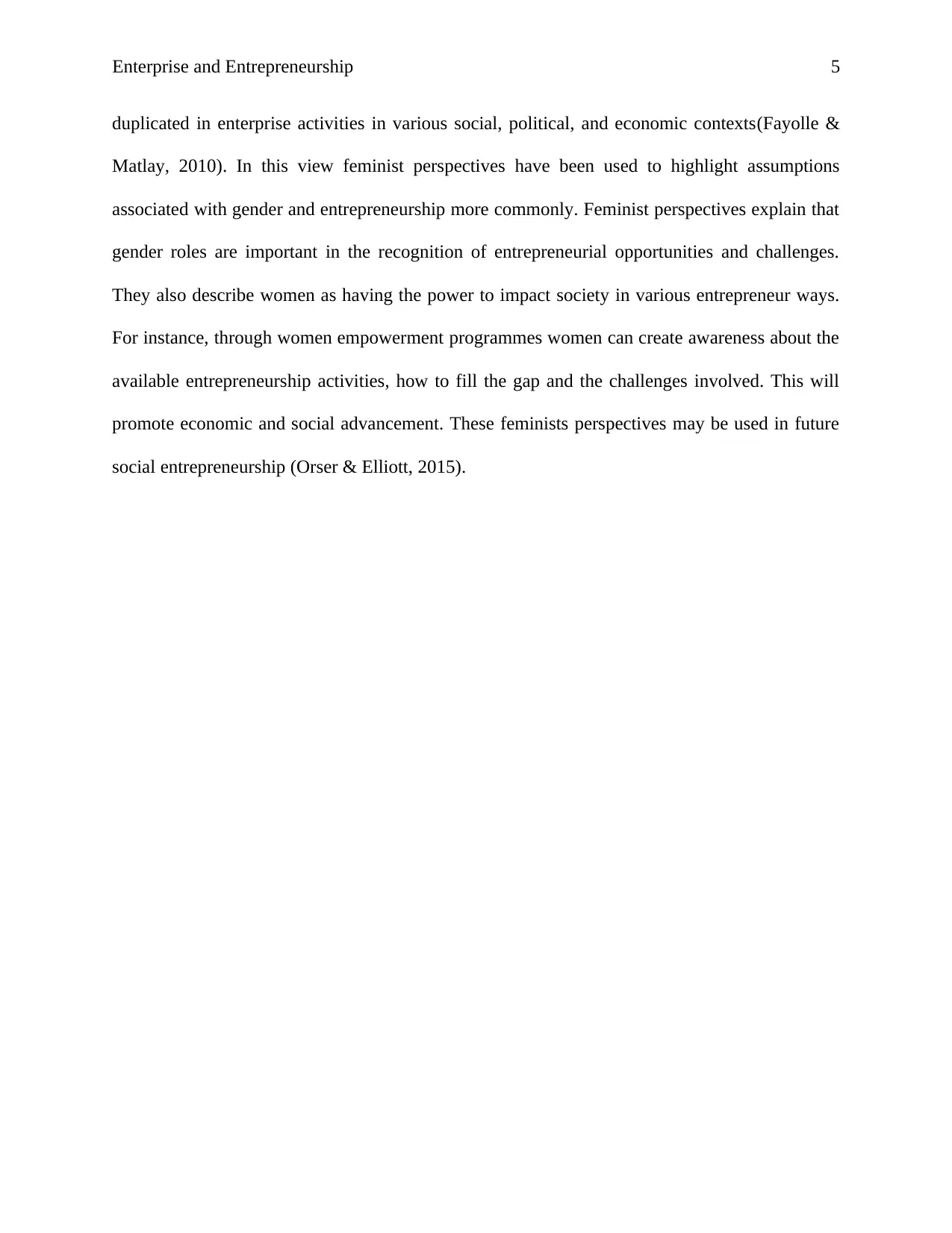
Enterprise and Entrepreneurship 5
duplicated in enterprise activities in various social, political, and economic contexts(Fayolle &
Matlay, 2010). In this view feminist perspectives have been used to highlight assumptions
associated with gender and entrepreneurship more commonly. Feminist perspectives explain that
gender roles are important in the recognition of entrepreneurial opportunities and challenges.
They also describe women as having the power to impact society in various entrepreneur ways.
For instance, through women empowerment programmes women can create awareness about the
available entrepreneurship activities, how to fill the gap and the challenges involved. This will
promote economic and social advancement. These feminists perspectives may be used in future
social entrepreneurship (Orser & Elliott, 2015).
duplicated in enterprise activities in various social, political, and economic contexts(Fayolle &
Matlay, 2010). In this view feminist perspectives have been used to highlight assumptions
associated with gender and entrepreneurship more commonly. Feminist perspectives explain that
gender roles are important in the recognition of entrepreneurial opportunities and challenges.
They also describe women as having the power to impact society in various entrepreneur ways.
For instance, through women empowerment programmes women can create awareness about the
available entrepreneurship activities, how to fill the gap and the challenges involved. This will
promote economic and social advancement. These feminists perspectives may be used in future
social entrepreneurship (Orser & Elliott, 2015).
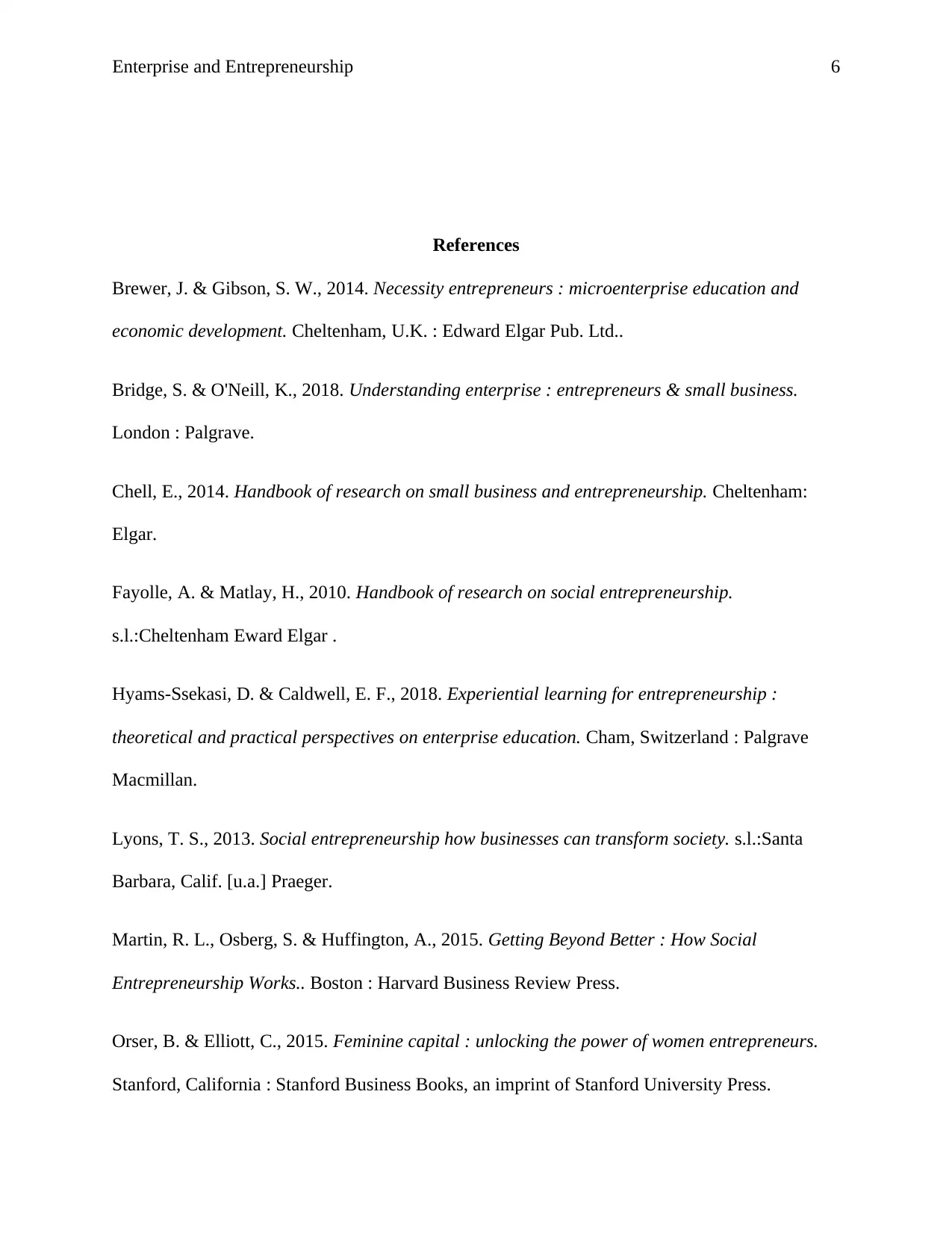
Enterprise and Entrepreneurship 6
References
Brewer, J. & Gibson, S. W., 2014. Necessity entrepreneurs : microenterprise education and
economic development. Cheltenham, U.K. : Edward Elgar Pub. Ltd..
Bridge, S. & O'Neill, K., 2018. Understanding enterprise : entrepreneurs & small business.
London : Palgrave.
Chell, E., 2014. Handbook of research on small business and entrepreneurship. Cheltenham:
Elgar.
Fayolle, A. & Matlay, H., 2010. Handbook of research on social entrepreneurship.
s.l.:Cheltenham Eward Elgar .
Hyams-Ssekasi, D. & Caldwell, E. F., 2018. Experiential learning for entrepreneurship :
theoretical and practical perspectives on enterprise education. Cham, Switzerland : Palgrave
Macmillan.
Lyons, T. S., 2013. Social entrepreneurship how businesses can transform society. s.l.:Santa
Barbara, Calif. [u.a.] Praeger.
Martin, R. L., Osberg, S. & Huffington, A., 2015. Getting Beyond Better : How Social
Entrepreneurship Works.. Boston : Harvard Business Review Press.
Orser, B. & Elliott, C., 2015. Feminine capital : unlocking the power of women entrepreneurs.
Stanford, California : Stanford Business Books, an imprint of Stanford University Press.
References
Brewer, J. & Gibson, S. W., 2014. Necessity entrepreneurs : microenterprise education and
economic development. Cheltenham, U.K. : Edward Elgar Pub. Ltd..
Bridge, S. & O'Neill, K., 2018. Understanding enterprise : entrepreneurs & small business.
London : Palgrave.
Chell, E., 2014. Handbook of research on small business and entrepreneurship. Cheltenham:
Elgar.
Fayolle, A. & Matlay, H., 2010. Handbook of research on social entrepreneurship.
s.l.:Cheltenham Eward Elgar .
Hyams-Ssekasi, D. & Caldwell, E. F., 2018. Experiential learning for entrepreneurship :
theoretical and practical perspectives on enterprise education. Cham, Switzerland : Palgrave
Macmillan.
Lyons, T. S., 2013. Social entrepreneurship how businesses can transform society. s.l.:Santa
Barbara, Calif. [u.a.] Praeger.
Martin, R. L., Osberg, S. & Huffington, A., 2015. Getting Beyond Better : How Social
Entrepreneurship Works.. Boston : Harvard Business Review Press.
Orser, B. & Elliott, C., 2015. Feminine capital : unlocking the power of women entrepreneurs.
Stanford, California : Stanford Business Books, an imprint of Stanford University Press.
⊘ This is a preview!⊘
Do you want full access?
Subscribe today to unlock all pages.

Trusted by 1+ million students worldwide

Enterprise and Entrepreneurship 7
1 out of 7
Related Documents
Your All-in-One AI-Powered Toolkit for Academic Success.
+13062052269
info@desklib.com
Available 24*7 on WhatsApp / Email
![[object Object]](/_next/static/media/star-bottom.7253800d.svg)
Unlock your academic potential
Copyright © 2020–2025 A2Z Services. All Rights Reserved. Developed and managed by ZUCOL.





